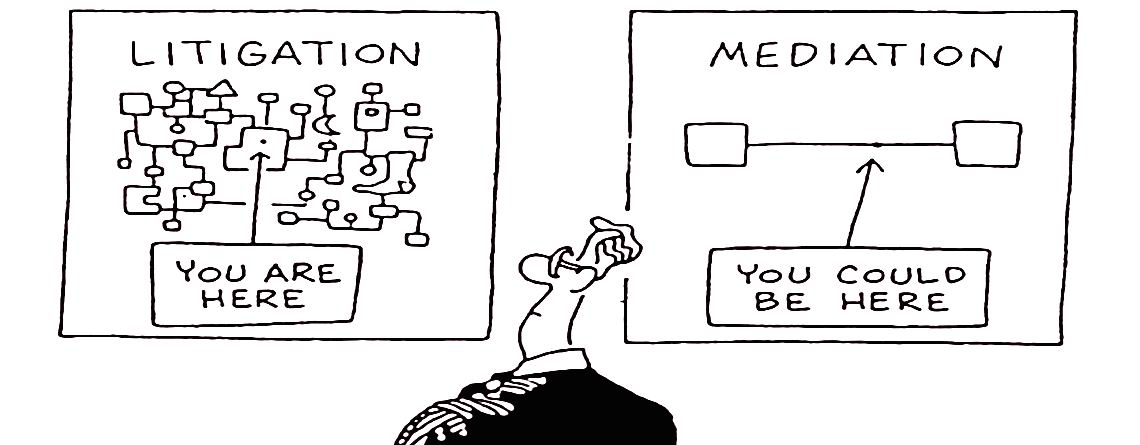Need Mediation? Ha Ha… You’re Funny
One may or may not agree, but for some Users and lawyers, mediation is just a funny gag. Like when one of my clients (who is also a friend) had been constantly calling me about an arbitration hearing, and I could only respond to him with a text message – “Busy. In a mediation. What happened?” To my wonder, the response was just – “Finally. LOL”. For a young mediator/mediation lawyer, it can be a challenge to spawn a new outlook, a fresh perspective, save for just the puns and anecdotal references of mediation.
I feel that the sense of pride in litigation is unfounded – its knees cut; hanging in mid-air; its worthiness laid off by the pain and suffering one undergoes (the lawyer and his client). And most importantly – no one forgets the injuries. Have you heard of that fable about ‘The Labourer & The Snake’? A Snake, having made his hole close to the porch of a cottage, inflicted a mortal bite on the Cottager’s infant son. Grieving over his loss, the Father resolved to kill the Snake. The next day, when it came out of its hole for food, he took up his axe, but by swinging too hastily, missed its head and cut off only the end of its tail. After some time the Cottager, afraid that the Snake would bite him also, endeavoured to make peace and placed some bread and salt in the hole. The Snake, slightly hissing, said: “There can henceforth be no peace between us; for whenever I see you I shall remember the loss of my tail, and whenever you see me you will be thinking of the death of your son.” Relationships are tough but mediation can serve peace in the midst of conflict.
Here’s what I could think of as the two possible reasons that cause these feelings towards mediation (Of course, there are certainly more, but these two have recurred in my experience too often) –
Have you been to a restaurant and have had a bad experience? One bad experience with food, and I almost never order the same thing twice. In fact, when I go out, I would rather not even go to the same restaurant twice (unless, of course, someone was treating!). Mediation is under-utilised and avoided since past experiences with mediation may have been bad – the process would not have made proper sense because it wasn’t managed well; there would have been far too many adjournments and wide gaps between sessions; the people would not have been educated about the process, empowered and encouraged; or lawyers would have given false impressions about mediation as a mere formality to comply. Mediations proceedings which have gone as long as 2 years is as good a lawsuit and a complete failure as an “alternative”. Negative and substandard experiences have tarnished mediation in India as a suitable effective alternative. I was once told by a User that in his view it was normally the claimant who compromises and yields to a less favourable settlement agreement. Nevertheless, we could both agree on why this would’ve generally happened. Situations are often thus because on numerous occasions it is far too late in the day to try mediation; being led by the wrong person; being conducted in a non-conducive and inappropriate ambiance; without any pre-mediation preparation and making spontaneous appearances in mediation sessions; and without the willingness to understand that the key to resolving conflict is suspension of one’s own point of view as the ‘only’ point of view. It is indispensable that when lawyers and clients attempt to mediate they must fully embrace mediation, and most importantly, do it the right way. Perhaps then, people would not have the kind of bad experience of making unfavourable discounts in order to simply end a matter.
Secondly, the fear of trying new things. It’s something like the feeling of trying new foods, an aversion that many have alternatively found amusing and fretful, thus, preferring instead to eat whatever one already knows he or she likes. Similarly, parties and advocates without an experience in mediation are reluctant to use it. In contrast, people with experience in mediation are much more receptive to trying mediation. Only when disputants gain more experience will we see greater use of mediation. The challenge is to break the cycle of no experience, no use (Harold Abramson, ‘Time to Try Mediation of International Commercial Dispute’).
Here’s what I want to advise you about the last point I made – evaluate your options meticulously, and avoid a remedy that is worse than the disease, or else you might just end up being like the Pigeons who were terrified by the appearance of a Kite, and called upon the Hawk to defend them. He at once consented. When they had admitted him into the cote, they found that he made more havoc and slew a larger number of them in one day than the Kite could pounce upon in a whole year. Does that help you imagine the stakes involved in choosing the appropriate forum? Excuse my affair with allegories but I think that somehow it expresses the best of what I want to say, and what you need to read and understand… about what I want to say :-p
There are two other monstrous aspects which, in my opinion, pull back the acceptance and growth of mediation – apathy, and distractions – both of which shift our focus to the wrong things and have a detrimental impact in the way we resolve disputes and in our choice of forum. I hope to address these in the coming future.



Leave a Reply